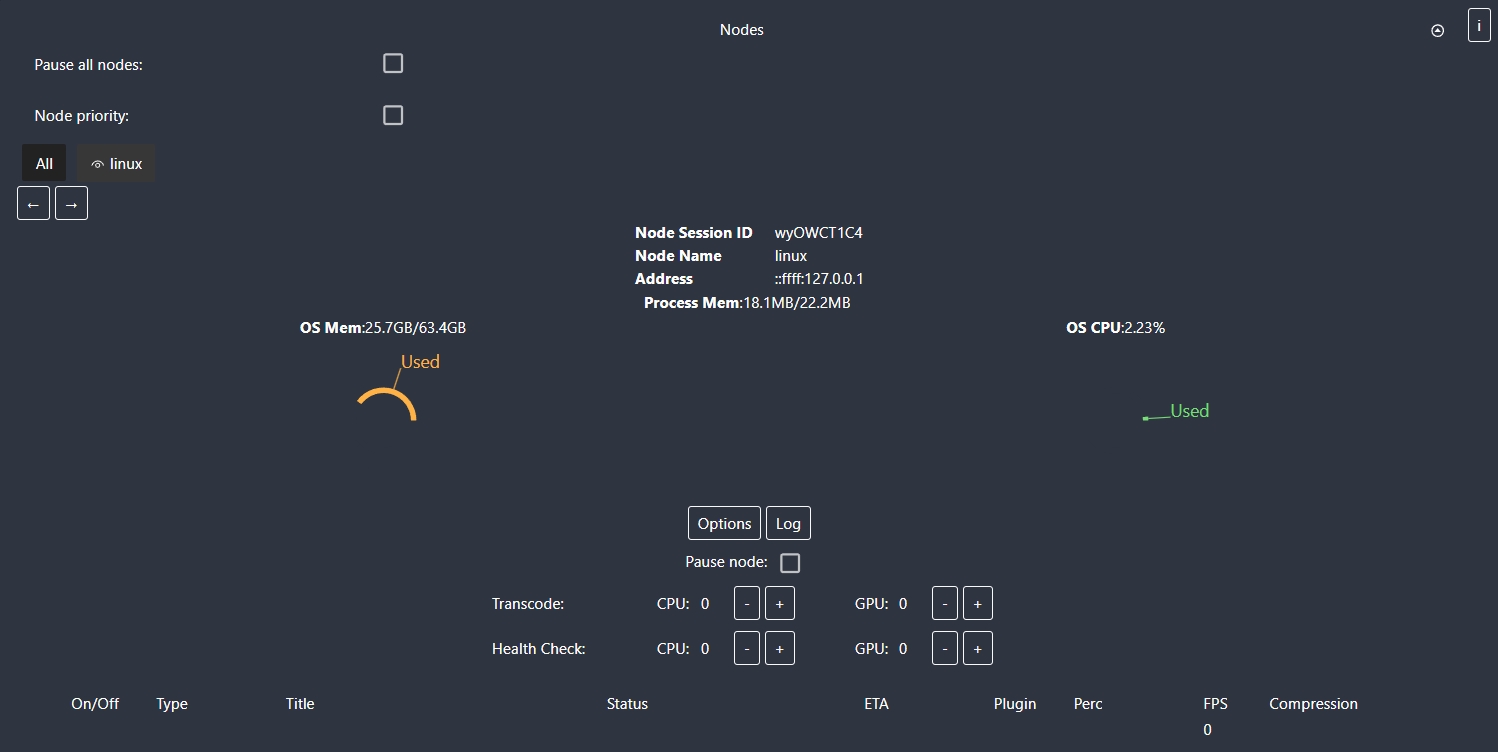Overview
Nodes can be viewed in the Tdarr WebUI on the Tdarr tab in the Nodes section.
Various node options can be found by clicking on the Node name and then clicking the Options button. The logs can be viewed by clicking the Logs button.

Node Types
There are 2 node types. Both node types can be used with health checks, classic plugin stacks and flows.
Mapped
This is the standard node type and is required to be either on the same file system as the server or have mapped volumes/shares which use Tdarr path translators to keep all file system operations in sync between node and server. So source and cache folders on the server and node should point to the same location.
Unmapped
Beta - New in 2.27.01 with Tdarr Pro
This new node type operates independently from the server's file system allowing easy setup when you're wanting to offload processing to a machine where share mappings etc are inconvenient or not possible. Download and upload of working files is handled automatically.
Unmapped nodes can be used without Tdarr Pro but with file size limitations:
- Video files: Up to 10MB
- Other files: Up to 0.1MB
Tdarr Pro removes these file size restrictions, allowing unmapped nodes to process files of any size.
However, there are some important caveats to consider:
Classic Plugin Stacks and Flows:
- The unmapped node will only work with plugins that act directly on the working file, such as audio/video transcoding and remuxing.
- It will not work with plugins that perform actions on non-working files (e.g., extracting subtitle streams into SRT files). In this scenario, the SRT files will remain on the unmapped node and won’t be transferred to the server. Future plugin updates will need additional logic to handle these scenarios. These sorts of operations are normally quick and non-intensive operations that can be performed on a mapped node.
- At the end of a plugin stack, the unmapped node will automatically upload the new file to the server.
Flows with File System Operations:
- For now, operations such as
Replace Original Fileand other file system-related tasks must be done on a mapped node. - To handle this, the flow should:
- Use the
Tags: Worker Typeflow plugin with the tagunmappedto first run transcoding or similar tasks on an unmapped node. - Then, use the
Tags: Worker Typeflow plugin with the tagmappedto process the file on a mapped node.
- Use the
- The mapped node will automatically download the file from the unmapped node and replace the original file on the server.
- For now, operations such as
In this way you can have a powerful unmapped node doing transcoding and a low powered mapped node that handles moving files around. See the Chapter 8: Unmapped Nodes flow tutorial for an example.
Usage
To use unmapped nodes, enable Allow unmapped Nodes on the Options tab in Tdarr, then set the following Node env/config variables:
nodeType=unmapped
unmappedNodeCache=/cache
Set unmappedNodeCache to wherever is convenient but it should be a dedicated directory just for Tdarr as the cache cleaner will automatically delete any files not related to Tdarr jobs.
When Allow unmapped Nodes is enabled, files in Tdarr's library source and cache folders will be accessible through Tdarr's network API. It's best to have authentication enabled.
When performing a quick or thorough health check on an unmapped node, the entire file will be sent to the node to be scanned